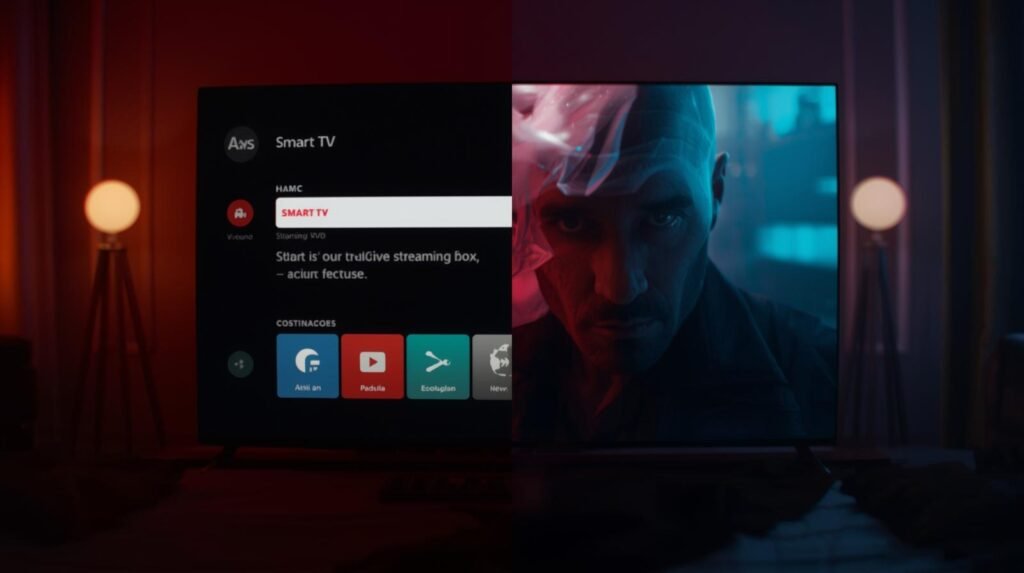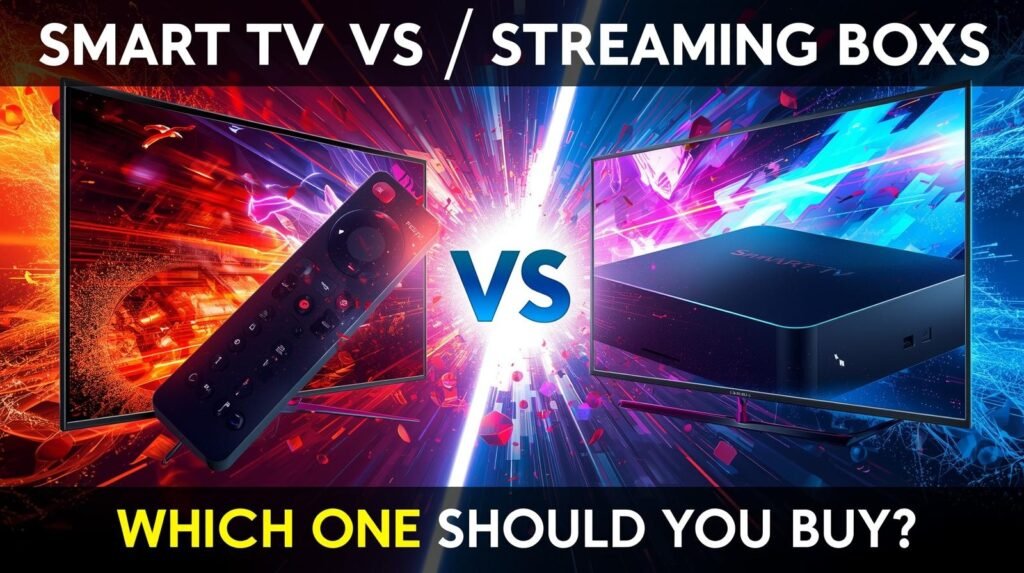In today’s era of digital entertainment IPTV, choosing between a Smart TV vs Streaming Box is a decision many consumers face. With endless streaming services like Netflix, Hulu, Disney+, and Amazon Prime Video dominating the way we consume content, both devices promise convenience, high-quality streaming, and easy access to apps. But the question remains: Which one is the smarter choice for you?
This comprehensive guide will dive deep into features, performance, usability, cost, and long-term value of Smart TVs vs. Streaming Boxes so you can make an informed decision.
What Is a Smart TV?
A Smart TV is essentially a television with built-in internet connectivity and integrated apps that allow users to stream content directly without additional hardware. Popular Smart TV brands include Samsung, LG, Sony, TCL, and Vizio, each offering their own operating systems such as Tizen, webOS, Google TV, or Roku TV.

Key Features of Smart TVs:
-
Built-in streaming apps (Netflix, YouTube, Prime Video, Hulu, etc.)
-
Integrated voice assistants like Alexa, Google Assistant, and Siri
-
Native app stores for downloading additional apps
-
Seamless compatibility with smart home ecosystems
-
4K, HDR, and even 8K support for superior viewing
While Smart TVs simplify your setup by combining everything into one device, they are not without limitations.
What Is a Streaming Box?
A Streaming Box (or streaming stick/dongle) is a dedicated external device that connects to your TV via HDMI and provides access to streaming services like IPTVUK . Popular devices include:

-
Apple TV 4K
-
Amazon Fire TV Stick / Fire TV Cube
-
Roku Streaming Stick / Roku Ultra
-
Google Chromecast with Google TV
-
NVIDIA Shield TV
Key Features of Streaming Boxes:
-
Regular software updates and faster performance
-
More flexibility in app selection
-
Support for advanced audio formats like Dolby Atmos
-
Portability — plug it into any TV with HDMI
-
Often more budget-friendly than upgrading to a new Smart TV
- providing IPTV services through 4k streaming
Streaming boxes are designed to focus exclusively on delivering the best streaming experience, often outperforming built-in Smart TV software.
Ease of Use: Smart TV vs Streaming Box
When it comes to usability, both options aim to deliver seamless streaming, but there are significant differences.

Smart TVs:
-
All-in-one convenience — no need for extra devices
-
Fewer cables and less clutter
-
Pre-installed apps for quick setup
-
However, software may feel slower or outdated after 2–3 years
-
Some brands restrict app availability based on region
Streaming Boxes:
-
Consistently smoother performance thanks to dedicated processors
-
Universal app support without heavy brand restrictions
-
Regular firmware and app updates
-
Voice search and better personalization features
-
Requires an HDMI port and separate remote
If you value simplicity and minimalism, a Smart TV may be best. But if you want speed, customization, and longevity, a streaming box has the upper hand.
Performance and Speed: Which Is Faster?
A Smart TV’s processing power is often secondary to its display features, while streaming boxes are engineered to optimize streaming performance.
-
Smart TVs can lag after a few years, especially with larger apps and updates.
-
Streaming Boxes like the NVIDIA Shield TV or Apple TV 4K boast powerful chipsets, ensuring faster navigation, quicker load times, and smoother playback.
For gamers and heavy users, streaming boxes are significantly faster and more reliable.
Content and App Availability
The number of available apps can drastically affect your viewing experience.
Smart TVs:
-
Limited by brand-specific app stores
-
May not support niche or new apps
-
Some apps get discontinued after a few years
Streaming Boxes:
-
Universal access to all major streaming platforms
-
Frequent updates and wider support for emerging services
-
Support for premium formats like Dolby Vision and HDR10+
If app variety and future-proofing are important to you, a streaming box is the clear winner.
Audio and Video Quality
Both Smart TV vs Streaming Box support 4K, HDR, and advanced audio standards, but the difference lies in consistency.
-
High-end Smart TVs deliver stunning visuals thanks to OLED, QLED, and Mini-LED technologies.
-
Streaming Boxes often lead in audio with Dolby Atmos and DTS:X support.
If you already own a high-quality TV, pairing it with a powerful streaming box may give you the best of both worlds.
Cost Comparison Smart TV vs Streaming Box
Smart TVs:
-
Prices range from $300 to over $2,000, depending on size and technology.
-
Cost includes display quality, smart features, and brand reputation.
-
Replacing an entire Smart TV just for software upgrades can be costly.
Streaming Boxes:
-
Budget options like Amazon Fire Stick start at $30–$50.
-
Premium models like Apple TV 4K and NVIDIA Shield TV cost between $120–$200.
-
Affordable way to extend the life of your current TV.
In terms of value for money, streaming boxes are a smarter investment unless you need a full TV upgrade.
Longevity and Software Updates
Smart TVs often fall behind when it comes to long-term updates. After 3–4 years, many models stop receiving software support, leaving you with outdated apps and slower performance.
Streaming boxes, on the other hand, receive frequent updates for years, ensuring you stay current with the latest apps, ukiptv , features, and security patches.
Who Should Buy a Smart TV?
A Smart TV is best for those who:
-
Want an all-in-one solution without extra devices
-
Prefer a minimalist setup with fewer remotes and cables
-
Don’t require advanced customization or niche apps
-
Are upgrading their display anyway (e.g., moving from HD to 4K/8K)
Who Should Buy a Streaming Box?
A streaming box is ideal for those who:
-
Already own a high-quality non-smart or outdated Smart TV
-
Want fast performance, more apps, and frequent updates
-
Are budget-conscious but want premium features
-
Travel frequently and want a portable streaming solution
Final Verdict: Smart TV vs Streaming Box
If your primary concern is simplicity, and you’re upgrading to a new display, then a Smart TV makes sense. But if you already own a great television and want the best possible streaming experience, a streaming box is the superior choice.
The reality is, many households end up using both — a Smart TV for casual viewing and a streaming box for advanced features and long-term performance.
Conclusion
The battle between Smart TV vs Streaming Box boils down to convenience versus performance. Smart TVs bring an all-in-one solution, while streaming boxes offer speed, flexibility, and longevity at a fraction of the cost.
Before making your decision, consider your budget, existing hardware, content preferences, and long-term needs. For most users seeking the best streaming experience, a streaming box remains the top recommendation. These two devices provide the services of IPTV by giving you IPTV Free trail for better experience.
